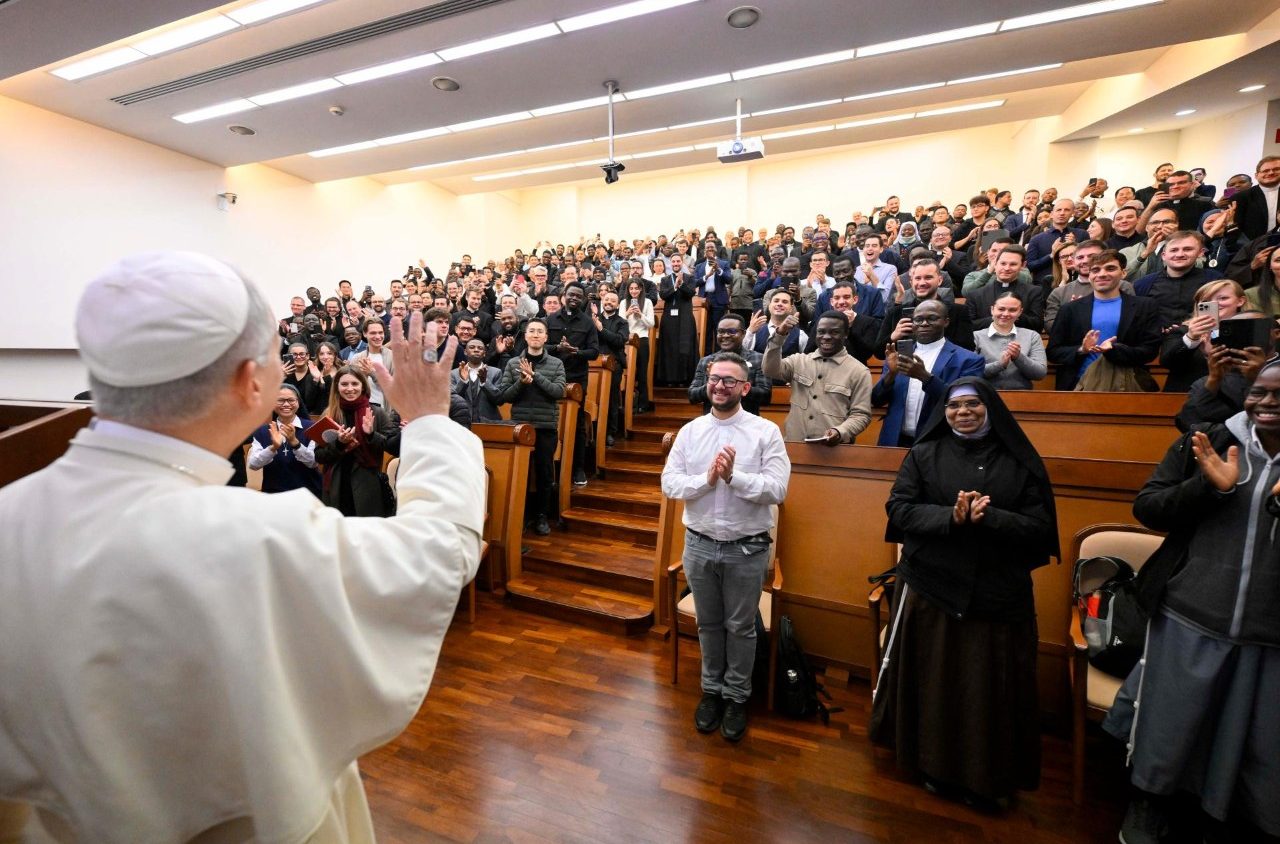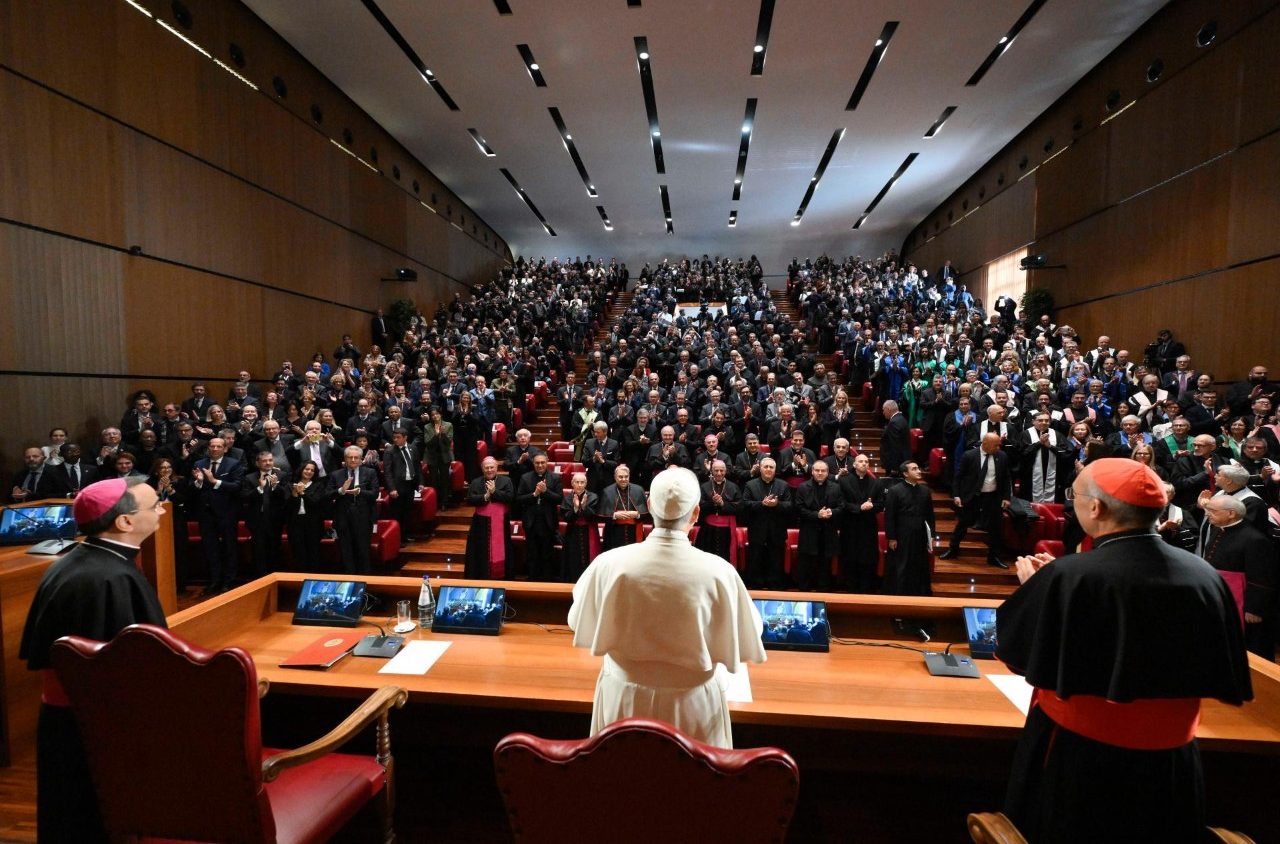Vatican City – This morning Pope Leo XIV inaugurated the new Academic Year of the Pontifical Lateran University, an event that, in his words and gestures, assumed a particularly significant meaning. Not only because it marks the 253rd year since the foundation of the University, but because the Pope wished to emphasize publicly – and affectively – the special bond that unites him to this institution: “my University.”
It was an expression that did not go unnoticed and found further confirmation in the words of the Rector Magnificus, H.E. Mons. Alfonso Amarante. Recounting how the invitation to the Pope originated, he revealed a telling detail: when asked to preside over the inauguration, Leo XIV replied without hesitation, “Of course, I am pleased to inaugurate it because it is my university, and I must begin with that one.” A choice that sounds like an act of paternity and, at the same time, a declaration of responsibility: the Pope as the first guardian of a place of thought, formation, and discernment.

A festive atmosphere
Upon his arrival, the Holy Father was greeted with enthusiasm: prolonged applause, smiles, and students gathered since early morning. Before the ceremony began, Leo XIV chose to meet with the students themselves. A simple gesture, yet one that set the tone for the entire morning: a university that does not inaugurate a bureaucratic year, but a shared journey.
The Pope’s address: identity and mission
In his remarks, the Pope intertwined two key themes: the history of the Lateran University and its mission today. He recalled the unique bond the University has had with the Successor of Peter since its origins—an unbroken line through the pontificates of Pius IX, Leo XIII, Pius XII, John XXIII, Paul VI, and Francis—a bond he now intends to reaffirm with conviction. The Lateran University, he stressed, does not have a charismatic founder like other ecclesiastical institutions. Its identity is different: “Its specific orientation is the Magisterium of the Pope.” For this reason, the Pope described it as a “privileged center” where the teaching of the universal Church is elaborated, received, and developed in dialogue with the cultural challenges of the present.

Three commitments for the future
Leo XIV then highlighted three dimensions he considers decisive for ecclesial and academic formation:
Reciprocity and fraternity
Against what Fratelli tutti calls the “virus of radical individualism,” the Pope asked the Lateran University to be a prophetic sign of communion, a place where the person is not reduced to an individual and where dialogue trains people for cooperation.
Scientific rigor
The Pope strongly emphasized the need to safeguard the seriousness of theological, philosophical, and juridical study. He warned against simplifications, superficiality, and that mindset—unfortunately widespread even within Church environments—which sees research as an academic luxury unrelated to pastoral life.
“We need competent laypeople and competent priests,” he stated firmly.
This point touches a sensitive nerve. For decades—especially after Vatican II—study has been perceived as marginal or even “wasted” on a priest, as though theological depth would distract him from “real” pastoral ministry. This short-sighted interpretation has caused damage: it has marginalized the most prepared priests, making them objects of suspicion or even obstacles. The phenomenon affects not only dioceses but also ecclesial movements, where it is not uncommon to see young priests who, after years of rigorous study and recognized achievements, become targets of distrust. Solid culture generates interior freedom, and this freedom often unsettles those who prefer docile consciences, easy to manipulate, and non-transparent forms of governance. The result is visible today: many dioceses are forced to appoint lay chancellors not because clergy are lacking, but because, for sixty years, part of the episcopate preferred to surround itself with courts and repeated slogans about pastoral work rather than engaging its presbyterate in study. Shepherds who chose ideology over discernment, neurotic authority over fatherhood. In this context, the Pope’s reminder rings like a warning: without culture there is no adult Church, and without well-prepared priests there is no real pastoral ministry.
Common good
The university must form men and women capable of vision, justice, and generosity—capable, he said, of “building a new world,” not merely describing it.
Culture of peace and integral ecology
Special attention was given to two programs introduced by Pope Francis—Peace Studies and Ecology and Environment—which Leo XIV considers integral to the recent Magisterium. He requested that they be strengthened and further integrated: forming peacebuilders and guardians of creation is not an accessory task but “an expression of the covenant between God and humanity.”
“My University”: a guiding bon
Perhaps the most significant and consequential point was not an academic program but a personal link. By saying “my University,” Leo XIV was not claiming ownership but responsibility. He effectively stated that the Lateran University is not just another institution: it is the place where the Church reflects on itself, where the future of Catholicism is shaped in the daily effort of study and dialogue.
It is no coincidence that he concluded: “The Lateran University holds a special place in the heart of the Pope, and the Pope encourages you to dream big.”
An invitation that sounds like a program: not merely transmitting content, but generating thought; not merely forming professionals, but forming Christians capable of understanding the world and opening it to the Gospel.
A beginning that is not a formality
As the Holy Father left the University—again amid applause and cameras—the widespread impression was that the morning had been more than an academic rite: it was a precise signal. Leo XIV chose to begin his visits to the pontifical universities here, “because it is my University,” and with this gesture entrusted to the Lateran University a part of his pontificate itself: to be a place where faith is thought, discerned, and opened to the challenges of the present and the future.
With a festive atmosphere and a speech that wove together history, responsibility, and vision, Mons. Amarante declared open the 2025–2026 Academic Year.
With one certainty left by the Pope as a final mandate: dreaming big is not optional. It is an ecclesial duty.
M.P
Silere non possum